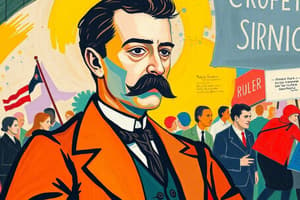Podcast
Questions and Answers
Who were the 3 progressive presidents? (Select all that apply)
Who were the 3 progressive presidents? (Select all that apply)
- William Taft (correct)
- Abraham Lincoln
- Woodrow Wilson (correct)
- Theodore Roosevelt (correct)
In what year did Theodore Roosevelt become President after McKinley was shot?
In what year did Theodore Roosevelt become President after McKinley was shot?
1901
The Square Deal was TR's domestic plan focused on controlling corporations, consumer protection, and conservation.
The Square Deal was TR's domestic plan focused on controlling corporations, consumer protection, and conservation.
True (A)
What did TR focus on with respect to business?
What did TR focus on with respect to business?
Who did TR appoint to lead the National Conservation Commission?
Who did TR appoint to lead the National Conservation Commission?
What was the outcome of the 1912 election?
What was the outcome of the 1912 election?
The Federal Reserve Act of 1913 established _____ regional reserve banks.
The Federal Reserve Act of 1913 established _____ regional reserve banks.
Wilson made significant progress in eliminating child labor.
Wilson made significant progress in eliminating child labor.
What did the Adamson Act establish for railroad employees?
What did the Adamson Act establish for railroad employees?
Study Notes
Progressive Era Presidents
- Three key progressive presidents: Theodore Roosevelt, William Taft, and Woodrow Wilson.
Theodore Roosevelt
- Assumed presidency in 1901 after the assassination of McKinley, becoming the youngest president at age 42.
- Had notable experience in both military and political office, advocating for business regulation and reforms.
- Known for his charisma and ability to connect with the public and the media.
- Revitalized the executive branch and engaged with the Progressive movement.
The Square Deal
- TR's domestic policy focused on three main principles:
- Regulation of corporations
- Consumer protection
- Conservation of natural resources
TR & Business
- Implemented strict antitrust policies against large businesses (trusts).
- Functioned as both a mediator and regulator, with the authority to prosecute large corporations.
TR & Conservation
- A passionate outdoorsman dedicated to environmental preservation.
- Tripled the amount of National Forest Land and committed to conserving forests and water resources.
Gifford Pinchot
- Appointed by Roosevelt to lead the National Conservation Commission (NCC).
- The NCC aimed to inventory and manage the nation's natural resources.
- Studied sustainable forestry practices in Europe.
William Taft
- Elected president in 1908, chosen by TR as his successor.
- Had a background as a lawyer and judge, with a contrasting style to TR.
- Continued progressive policies, emphasizing antitrust actions through court cases.
- Notably reduced tariffs and controversially fired Gifford Pinchot.
1912 Election
- Key candidates in the election:
- Woodrow Wilson (Democrat) - Winner
- William Taft (Republican)
- Theodore Roosevelt (Progressive Party)
- Eugene Debs (Socialist Party)
Woodrow Wilson
- From a wealthy, educated background with experience in academia and politics.
- Advocated for a progressive agenda known as "New Freedom", focusing on reforms in tariffs, banking, and business.
- Aimed to widen economic opportunities for the lower class and eliminate special privileges.
- Continued a strong anti-trust stance.
Banking Reform
- Introduced the Federal Reserve Act of 1913, which established 12 regional reserve banks.
- Enabled control over interest rates and the national money supply to stabilize the economy.
Wilson & Reform
- Enhanced credit availability for farmers and established workers' compensation.
- Failed to address child labor issues adequately.
- Suspended reform efforts during World War I.
Adamson Act
- Enacted in 1916 to avert a railroad strike, establishing an eight-hour workday for railroad workers and industrial employees.
Studying That Suits You
Use AI to generate personalized quizzes and flashcards to suit your learning preferences.
Description
Test your knowledge on the key figures of the Progressive Era with these flashcards. This quiz focuses on Presidents Theodore Roosevelt, William Taft, and Woodrow Wilson, exploring their contributions and impacts on American society.




